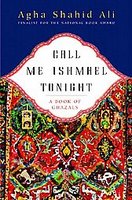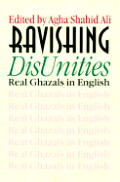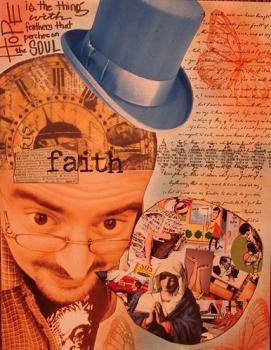Poetry Thursday - The Ghazal Take 2
Last month I posted a poem I wrote in a poetic form known as a ghazal. We asked me who I'd recommend who wrote in this form. There are many great poets who have used the form over the past millenia. Rumi who has been widely translated, but didn't write solely ghazals and Ghalib who is much lesser known and sadly not as widely translated. There are a few books I go to time and again when I am feeling in the mood for a ghazal fix:

Agha Shaid Ali – Call Me Ishmael Tonight: A posthumous collection of ghazals written by one of the best poets of his generation. He died way too soon. His love for poetic form isn't just academic. All of the poems in this collection are meditative and deeply spiritual. I use his works as a guide for my own for he attempts to use poetry to explain what can't always be put into words. There is a modern myth that writing in fixed form is confining and restrictive. Ali liberates the poems through form.

Agha Shaid Ali, ed. -- Ravishing Disunities: One of my favorite anthologies. Ali selected a who's who of poets who best utilized the ghazal like: W.S. Merwin, Dianne Ackermann, Paul Muldoon, & Marilyn Hacker. Though all of the work is pretty strong it can get tired at times. It also lacks the faith based core which makes Ali's work so transcendent.
 Robert Bly – The Night Abraham Called To The Stars: Robert Bly is the Bob Dylan of poetry. You never know what he is going to offer with each book. He focuses on translation for one volume, then he writes nothing but prose poems, ending with poems he wrote each morning before breakfast. I can't keep up with him which is good because it keeps his work fresh. He manages to put out a consistent body of work. Though I wish he'd stay in one place long enough for me grasp what it is he is trying to do with his work. I am wary to include this book because he plays looesy goosey with the form. He takes liberties with several poems to make them not strictly ghazals. I include it because he was willing to go beyond the definition to claim the form as his own.
Robert Bly – The Night Abraham Called To The Stars: Robert Bly is the Bob Dylan of poetry. You never know what he is going to offer with each book. He focuses on translation for one volume, then he writes nothing but prose poems, ending with poems he wrote each morning before breakfast. I can't keep up with him which is good because it keeps his work fresh. He manages to put out a consistent body of work. Though I wish he'd stay in one place long enough for me grasp what it is he is trying to do with his work. I am wary to include this book because he plays looesy goosey with the form. He takes liberties with several poems to make them not strictly ghazals. I include it because he was willing to go beyond the definition to claim the form as his own. The poem I chose is a looser version of the Ghazal. I do not know when the stricter form came into play. Either way, this is a brilliant poem. I love how he writes himself into the poem.
The Clay Cup
Ghalib
If King Jamshid's diamond cup breaks, that's it.
But my clay cup I can easily replace, so it's better.
The delight of giving is deeper when the gift hasn't been demanded.
I like the God-seeker who doesn't make a profession of begging.
When I see God, color comes to my cheeks.
God thinks -- this is a bad mistake -- that I'm in good shape.
When a drop falls in the river, it becomes the river.
When a deed is done well, it becomes the future.
I know that Heaven doesn't exist, but the idea
Is one of Ghalib's favorite fantasies.
posted by Out Of Jersey | 6:19 PM
![]()
![]()



2 Comments:
I am a fan of Hafiz, so I am definately going to check out Bly and Agha Shaid Ali. Thank you for the suggestions!
BTW, the last couple of posts have been some of your best. Your last post was very deep and very helpful to me.
I have just started to read some Hafiz's work. Unfortunatley, the guy who does the most translating of his work insists on doing a center justification, which to me looks very odd.
I appreciate the kind words on my past few posts. It's amazing how things that come out of our own frustrations and hurts can benefit others.
Post a Comment
<< Home